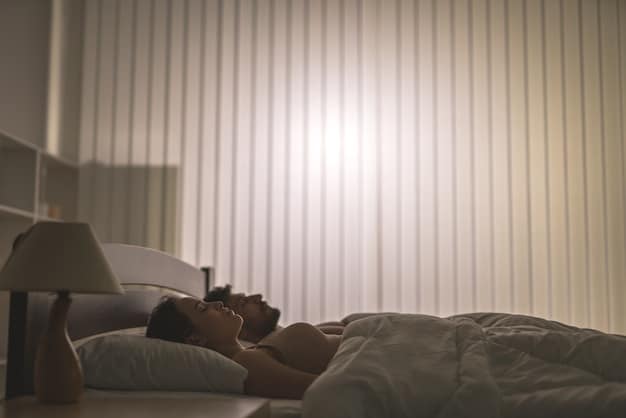Reset Your Circadian Rhythm: 7 Days to Stress Relief

Is Your Sleep Schedule Sabotaging Your Stress Relief? How to Reset Your Circadian Rhythm in 7 Days explores the link between irregular sleep patterns and increased stress, offering a practical week-long plan to realign your body’s natural clock for better sleep and reduced stress levels.
Do you find yourself constantly battling stress, even when you think you’re doing everything right? The culprit might be hiding in plain sight: your sleep schedule. Is Your Sleep Schedule Sabotaging Your Stress Relief? How to Reset Your Circadian Rhythm in 7 Days dives into how an inconsistent sleep-wake cycle throws your body’s natural rhythms off balance, leading to heightened stress and decreased overall well-being.
The Sleep-Stress Connection: How Your Circadian Rhythm Matters
Understanding the intricate relationship between sleep and stress is crucial for maintaining overall health and well-being. Your circadian rhythm, your body’s internal clock, plays a significant role in regulating not only your sleep patterns but also your stress responses. Disruptions to this natural rhythm can lead to a cascade of negative effects, impacting your physical and mental health.
The Circadian Rhythm and Its Impact
The circadian rhythm is a roughly 24-hour cycle that governs various physiological processes, including sleep-wake cycles, hormone release, and body temperature. It’s influenced by external cues like sunlight and meal times, helping to synchronize your internal clock with the external world. When this rhythm is disrupted, it can throw your entire system out of whack.
How Sleep Deprivation Fuels Stress
When you don’t get enough sleep, your body produces more cortisol, the stress hormone. Elevated cortisol levels can lead to increased anxiety, irritability, and difficulty concentrating. Furthermore, sleep deprivation impairs your ability to cope with stress effectively, making you more reactive to daily stressors. Research consistently shows that those with chronic sleep issues are more prone to experiencing heightened stress and anxiety.
Conversely, adequate and consistent sleep helps regulate cortisol levels, promotes emotional stability, and enhances cognitive function. A well-rested body is better equipped to handle stress, allowing you to approach challenges with a clearer mind and a more balanced emotional state. This highlights the importance of prioritizing sleep as a cornerstone of stress management.

Consequences of a Sabotaged Sleep Schedule
- Increased Stress Hormones: As mentioned, irregular sleep elevates cortisol, intensifying stress responses.
- Weakened Immune System: Sleep deprivation weakens the immune system, making you more susceptible to illness. A compromised immune system can further exacerbate stress levels.
- Mood Swings and Irritability: Lack of sleep directly impacts mood regulation, leading to increased irritability, anxiety, and even depression.
- Impaired Cognitive Function: Sleep deprivation affects cognitive abilities like memory, concentration, and decision-making, which can hinder your ability to manage stress effectively.
In conclusion, recognizing the significant role of the circadian rhythm and sleep in managing stress is the first step toward reclaiming control over your well-being. Prioritizing sleep and establishing a consistent sleep schedule can have a profound impact on reducing stress levels and improving overall health.
Identify Your Sleep Disruptors: Common Culprits
Before you can effectively reset your circadian rhythm, it’s essential to identify the factors that are disrupting your sleep. Many common habits and environmental influences can interfere with your body’s natural clock, leading to inconsistent sleep patterns and increased stress. Recognizing these culprits is the first step towards taking corrective action.
Screen Time Before Bed
The blue light emitted from electronic devices like smartphones, tablets, and computers can suppress the production of melatonin, the hormone that regulates sleep. Using these devices close to bedtime can make it harder to fall asleep and disrupt the quality of your sleep throughout the night. The constant stimulation from social media, news, and other content can also keep your mind racing, further interfering with relaxation and sleep.
Caffeine and Alcohol Consumption
Caffeine is a stimulant that can stay in your system for several hours, making it difficult to fall asleep if consumed too late in the day. Alcohol, while it may initially make you feel drowsy, can disrupt your sleep later in the night, leading to fragmented sleep and early awakenings. Both substances can interfere with the natural sleep cycle and contribute to poor sleep quality.
Inconsistent Meal Times
Your body’s internal clock is also influenced by meal times. Eating at irregular hours can disrupt your circadian rhythm and make it harder to maintain a consistent sleep schedule. Large meals close to bedtime can also interfere with sleep, as your body is busy digesting rather than winding down for rest.
Furthermore, stress itself can exacerbate these sleep disruptors. When you’re stressed, you may be more likely to reach for caffeine or alcohol to cope, or you may find it harder to resist the urge to scroll through social media before bed. This creates a vicious cycle, where stress disrupts sleep, and then poor sleep further intensifies stress levels.
- Late-Night Snacking: Eating heavy, sugary, or processed foods before bed can lead to indigestion and disrupt sleep.
- Irregular Bedtimes and Wake-Up Times: Maintaining a consistent sleep schedule, even on weekends, helps regulate your circadian rhythm.
- Stressful Activities Before Bed: Engaging in stressful activities like work or intense conversations close to bedtime can keep your mind racing and prevent you from relaxing.
In conclusion, identifying and addressing these common sleep disruptors is essential for resetting your circadian rhythm and improving your sleep quality. Establishing healthy sleep habits and creating a relaxing bedtime routine can help you break free from the cycle of sleep disruption and stress.
The 7-Day Reset: A Step-by-Step Guide to Realigning Your Sleep
Ready to take control of your sleep and stress levels? This 7-day plan provides a structured approach to resetting your circadian rhythm and establishing a consistent sleep schedule. Each day builds upon the previous one, gradually realigning your body’s internal clock and promoting restful sleep.
Day 1: Assess Your Current Sleep Habits
Start by tracking your sleep patterns for a few days. Note the times you go to bed, wake up, and any factors that might be affecting your sleep, such as caffeine consumption, screen time, or stress levels. This will give you a baseline to work from and help you identify areas for improvement.
Day 2: Optimize Your Sleep Environment
Create a sleep-friendly environment in your bedroom. This includes ensuring it’s dark, quiet, and cool. Use blackout curtains, earplugs, or a white noise machine to minimize distractions. Invest in a comfortable mattress, pillows, and bedding to promote restful sleep. A comfortable and conducive sleep environment can make a significant difference in your sleep quality.
Day 3: Establish a Consistent Sleep Schedule
Go to bed and wake up at the same time every day, even on weekends. This will help regulate your circadian rhythm and make it easier to fall asleep and wake up feeling refreshed. Consistency is key when it comes to retraining your body’s internal clock.
It’s also crucial to be patient and consistent. It may take a few weeks for your body to fully adjust to the new sleep schedule. Don’t be discouraged if you don’t see immediate results. Stick with the plan, and over time, you’ll begin to notice improvements in your sleep quality and stress levels.

- Day 4: Limit Screen Time Before Bed: Reduce screen time at least an hour before bed. Engage in relaxing activities like reading or taking a warm bath instead.
- Day 5: Watch Caffeine and Alcohol Consumption: Avoid caffeine and alcohol in the afternoon and evening. Opt for herbal tea or water instead.
- Day 6: Incorporate Relaxation Techniques: Practice relaxation techniques like deep breathing, meditation, or yoga to reduce stress and promote sleep.
- Day 7: Review and Adjust: Reflect on your progress and make any necessary adjustments to your sleep schedule or habits.
In conclusion, by following this 7-day plan, you can effectively reset your circadian rhythm, establish a consistent sleep schedule, and reduce your stress levels. Remember to be patient, consistent, and adaptable as you work towards improving your sleep and overall well-being.
The Role of Light Exposure in Regulating Your Circadian Rhythm
Light exposure is a powerful regulator of your circadian rhythm. Understanding how light affects your body’s internal clock can help you optimize your sleep schedule and reduce stress. Strategic light exposure can serve as a valuable tool in realigning your sleep patterns.
Morning Light: Your Natural Wake-Up Call
Exposing yourself to bright light, ideally sunlight, in the morning helps suppress melatonin production and signals to your body that it’s time to wake up. This can help you feel more alert and energized throughout the day. Aim for at least 30 minutes of sunlight exposure within the first hour of waking up. If sunlight is not available, consider using a light therapy lamp.
Evening Darkness: Preparing for Sleep
As evening approaches, it’s important to minimize exposure to bright light, especially blue light from electronic devices. Dimming the lights in your home and avoiding screens for at least an hour before bed can help promote melatonin production and prepare your body for sleep. Creating a dark and calming environment in the evening is crucial for a healthy sleep cycle.
The Impact of Artificial Light
Artificial light, particularly blue light, can disrupt your circadian rhythm by suppressing melatonin production. This can make it harder to fall asleep and lead to poor sleep quality. Minimizing exposure to artificial light in the evening is essential for maintaining a healthy sleep schedule. This may involve using blue light filters on your devices or wearing blue light-blocking glasses.
In addition to adjusting your light exposure, consider other factors that can influence your circadian rhythm, such as meal times and physical activity. Eating at regular hours and engaging in regular exercise can help synchronize your internal clock and promote consistent sleep patterns.
- Sunlight Exposure: Aim for consistent sunlight exposure in the morning to regulate your sleep-wake cycle.
- Blue Light Blocking: Use blue light filters on your electronic devices and consider wearing blue light-blocking glasses in the evening.
- Dim Lighting: Create a dim and calming environment in your home in the evening to prepare your body for sleep.
In conclusion, by understanding the powerful role of light exposure in regulating your circadian rhythm, you can take proactive steps to optimize your sleep schedule and reduce stress. Strategic light exposure, combined with healthy sleep habits, can significantly improve your sleep quality and overall well-being.
Mindfulness and Relaxation Techniques for Stress Reduction
Stress is a common sleep disruptor. Incorporating mindfulness and relaxation techniques into your daily routine, especially before bed, can help reduce stress levels and promote restful sleep. These techniques work by calming the mind and body, making it easier to fall asleep and stay asleep throughout the night.
Deep Breathing Exercises
Deep breathing exercises can help activate the parasympathetic nervous system, which is responsible for the “rest and digest” response. Slow, deep breaths can lower your heart rate, reduce muscle tension, and calm your mind. Practice deep breathing exercises for a few minutes before bed to promote relaxation.
Meditation and Mindfulness
Meditation involves focusing your attention on the present moment, without judgment. Mindfulness is a type of meditation that encourages you to observe your thoughts and feelings without getting carried away by them. Both practices can help reduce stress and promote relaxation. Numerous apps and online resources offer guided meditation sessions for beginners.
Progressive Muscle Relaxation
Progressive muscle relaxation involves tensing and then releasing different muscle groups in your body. This technique can help you become more aware of muscle tension and learn how to release it. Start with your toes and work your way up to your head, tensing each muscle group for a few seconds and then releasing it. This technique can effectively reduce overall tension and promote calm.
Furthermore, consider incorporating other stress-reducing activities into your daily routine, such as spending time in nature, listening to calming music, or engaging in a hobby you enjoy. Making time for enjoyable activities can help you manage stress and improve your overall well-being.
- Yoga and Tai Chi: These practices combine physical movement with mindfulness and breathing techniques, promoting relaxation and stress reduction.
- Journaling: Writing down your thoughts and feelings can help you process emotions and reduce stress.
- Warm Baths: Taking a warm bath before bed can relax your muscles and promote sleep.
In conclusion, incorporating mindfulness and relaxation techniques into your routine can significantly reduce stress levels and promote restful sleep. Experiment with different techniques to find what works best for you and make them a regular part of your bedtime routine.
When to Seek Professional Help for Sleep and Stress
While lifestyle changes and self-help techniques can be effective in resetting your circadian rhythm and managing stress, there are times when seeking professional help is necessary. If you’re experiencing persistent sleep problems or excessive stress that’s impacting your daily life, it’s important to consult with a healthcare professional.
Signs You Need Professional Help
If you experience symptoms such as difficulty falling asleep or staying asleep most nights, excessive daytime sleepiness, frequent awakenings, or difficulty concentrating due to lack of sleep, it’s time to seek professional help. Similarly, if you have persistent feelings of anxiety, depression, or overwhelm, it’s important to reach out to a mental health professional.
Types of Healthcare Professionals to Consult
Depending on your specific needs, you may want to consult with a primary care physician, a sleep specialist, or a mental health professional. A primary care physician can evaluate your overall health and rule out any underlying medical conditions that may be contributing to your sleep or stress problems. A sleep specialist can diagnose and treat sleep disorders like insomnia or sleep apnea. A mental health professional can provide therapy and support for managing stress, anxiety, and depression.
Available Treatment Options
Treatment options for sleep and stress problems may include lifestyle modifications, therapy, medication, or a combination of these approaches. Lifestyle modifications may include improving your sleep hygiene, managing your diet and exercise habits, and reducing your caffeine and alcohol consumption. Therapy, such as cognitive behavioral therapy (CBT), can help you identify and change negative thought patterns and behaviors that contribute to sleep or stress problems. Medications, such as sleep aids or antidepressants, may be prescribed in some cases to help manage symptoms.
Remember, seeking professional help is a sign of strength, not weakness. Addressing your sleep and stress problems with the support of a healthcare professional can significantly improve your quality of life and overall well-being.
- Sleep Studies: If you suspect you have a sleep disorder like sleep apnea, a sleep study can help diagnose the problem.
- Cognitive Behavioral Therapy (CBT): CBT is a type of therapy that can help you change negative thought patterns and behaviors that contribute to insomnia and stress.
- Medication: In some cases, medication may be necessary to manage sleep or stress problems.
In conclusion, it’s important to be aware of when to seek professional help for sleep and stress problems. Consulting with a healthcare professional can provide you with the support and treatment you need to improve your sleep and overall well-being.
| Key Point | Brief Description |
|---|---|
| ⏰ Consistent Sleep | Regulate your circadian rhythm by maintaining a consistent sleep schedule. |
| ☀️ Light Exposure | Maximize morning light and minimize evening blue light exposure. |
| 🧘 Relaxation | Practice deep breathing, meditation, or progressive muscle relaxation. |
| 🩺 Professional Help | Seek professional help for persistent sleep or stress problems. |
Frequently Asked Questions
▼
The circadian rhythm is your body’s internal clock, which regulates sleep-wake cycles and other physiological processes over a roughly 24-hour period, influencing hormone release, body temperature, and alertness levels throughout the day.
▼
Stress can lead to the release of cortisol, a stress hormone, which interferes with the body’s ability to relax and fall asleep. Chronic stress can disrupt sleep patterns, causing insomnia and fragmented sleep cycles.
▼
To optimize your sleep environment, ensure your bedroom is dark, quiet, and cool. Use blackout curtains, earplugs, or a white noise machine to minimize distractions. Invest in a comfortable mattress, pillows, and bedding to promote restful sleep.
▼
Exposure to sunlight in the morning helps regulate your circadian rhythm by suppressing melatonin production. Minimizing exposure to blue light from electronic devices in the evening can help promote sleep by allowing melatonin levels to rise.
▼
Seek professional help if you experience persistent difficulty falling asleep or staying asleep, excessive daytime sleepiness, frequent awakenings, or difficulty concentrating due to lack of sleep. A healthcare professional can diagnose and treat underlying issues.
Conclusion
Is Your Sleep Schedule Sabotaging Your Stress Relief? How to Reset Your Circadian Rhythm in 7 Days has explored the intricate relationship between sleep, stress, and your circadian rhythm. By implementing the strategies discussed, from establishing a consistent sleep schedule to optimizing light exposure and incorporating relaxation techniques, you can take control of your sleep, reduce stress, and improve your overall well-being. Remember, prioritizing sleep is an investment in your health and a key component of effective stress management.





